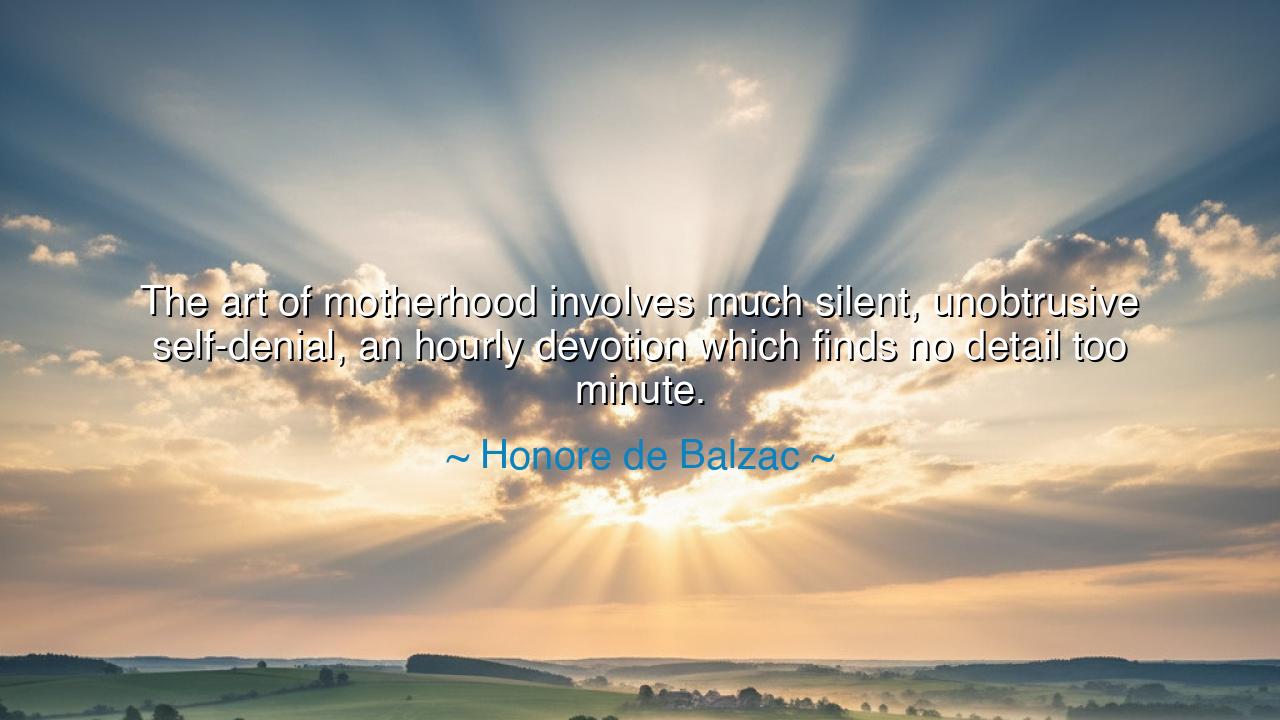
The art of motherhood involves much silent, unobtrusive
The art of motherhood involves much silent, unobtrusive self-denial, an hourly devotion which finds no detail too minute.






In the words of Honoré de Balzac, “The art of motherhood involves much silent, unobtrusive self-denial, an hourly devotion which finds no detail too minute.” These words, like a quiet bell ringing through the corridors of time, speak of the sacred humility that lies at the heart of motherhood. It is not an art of glory or applause, but of endless giving; not of great victories sung by poets, but of countless small sacrifices that go unseen by all but Heaven. In this truth lies one of the oldest and most noble forms of strength: the strength to serve without recognition, to love without condition, and to devote oneself wholly to another’s becoming.
In the days of old, the ancients revered those who conquered nations and bent the earth to their will. Yet they also spoke, in hushed reverence, of those who conquered themselves. The mother is such a conqueror—her battlefield is the home, her victory the flourishing of her child. Where others seek fame through noise and triumph, she creates greatness through stillness and tenderness. The self-denial that Balzac speaks of is not an act of weakness, but of divine mastery: to quiet one’s own desires for the sake of another’s growth, to find joy not in receiving, but in giving.
Consider the life of Abigail Adams, wife of John Adams and mother of John Quincy Adams, both Presidents of the United States. While history remembers her husband’s political achievements and her son’s leadership, it often forgets the quiet endurance of the woman who shaped them. In letters written during the storms of revolution, Abigail’s words reveal her deep hourly devotion—teaching, comforting, managing, and guiding a family alone while her husband built a nation. She asked for no monument, no recognition, only the knowledge that her family’s honor and purpose endured. Through her silent sacrifices, she became a pillar of strength that bore the weight of an era.
Balzac’s wisdom reminds us that the art of motherhood is indeed an art—delicate, deliberate, and infinitely detailed. Every moment, every choice, every unnoticed gesture forms the strokes of an invisible masterpiece. It is the mother’s unseen hand that steadies the child’s first steps, her watchful eye that guards their sleep, her whispered words that shape their conscience. No detail is too small, for in her care, the ordinary becomes sacred. Even the act of mending a torn garment or soothing a restless heart carries within it the essence of love’s perfection.
Yet, this path is not without pain. The self-denial of motherhood often feels like vanishing—a fading of one’s own identity into the needs of others. Many mothers have stood at that quiet crossroads and asked, “Who am I, now that I have given everything?” But here lies the paradoxical beauty of devotion: in giving herself away, the mother does not lose her essence—she expands it. Her love, poured out in silence, becomes the thread that weaves generations together. She becomes not smaller, but infinite.
Let this be known to all who hear: greatness often hides in gentleness. The mother who rises at dawn to tend her child’s needs, who sets aside her dreams for another’s sake, who labors without praise—she practices a higher art than any sculptor or king. Her life may seem simple, but in her quiet discipline lies the secret of the universe: that love, given freely and humbly, is the force that sustains all creation.
Take this lesson to heart. In a world that celebrates the loud and the grand, learn to honor the silent devotion that shapes humanity’s future. Whether you are a mother or one touched by a mother’s care, cherish the unseen hands that built your strength. Practice your own form of unobtrusive self-denial—through patience, kindness, and mindful attention to those around you. Find no detail too minute when love is the purpose.
For in the end, the art of motherhood is the art of life itself: to serve, to nurture, to endure—and through every quiet act of devotion, to become part of something eternal. The mother’s love does not seek glory, yet it creates worlds. And those who learn from her example will find that the greatest power of all is not in ruling, but in giving.






AAdministratorAdministrator
Welcome, honored guests. Please leave a comment, we will respond soon